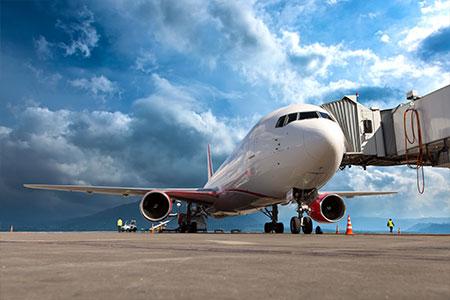Decarbonising Aviation Common Interest Group

This Common Interest Group tackles the challenge of decarbonising aviation. It brings together government representatives, members of the ITF Corporate Partnership Board and other stakeholders.
Aviation’s contribution to global greenhouse gas emissions (GHGs) is high and projected to grow. Before the Covid-19 pandemic, the sector caused about 2.5% of the world’s GHGs. Whilst the pandemic caused a temporary reduction in air travel and therefore aviation emissions, demand for flying is expected to rise in the coming years.
A more fuel-efficient fleet will not suffice to reduce aviation emissions. Modern aircraft are around 20% more energy efficient than previous models, and fleet modernisations have almost halved the energy intensity per passenger since the early 2000s. However, the sector’s total energy demand has increased by over 50% in this period due to increased air travel demand. This trend has set the industry on a path of growing GHG emissions.
The airline industry has pledged to become carbon neutral by 2050. There are high expectations on member countries of the International Civil Aviation Organization (ICAO) for an international agreement that would reduce aviation emissions to levels compatible with the objectives of the 2015 Paris Agreement.
What we do
Sustainable Aviation Fuels (SAF) are one important way to reduce aircraft emissions. They can be used with existing aircraft and the current refuelling infrastructure at airports. SAF have the same properties as conventional fossil-based aviation fuels. However, they are produced from bioenergy or as synthetic fuels from green hydrogen and carbon, so their carbon intensity is very low.
The Group’s goal is to advance policies that increase the use of SAF because they can reduce emissions faster than other novel technologies. Unlike electric or hydrogen-powered aircraft, SAF technology is ready for larger-scale implementation now. This is critical, since aircraft entering service today have a long lifetime – they will still operate in 2050, the year the airline industry has pledged to be carbon-neutral.
How we do it
The Common Interest Group organises regular meetings to provide governments with answers to crucial questions regarding the scaling-up of SAF production. Dialogue among participants centres on identifying best-practice policies such as deployment targets, regulatory mandates and other incentives to stimulate production. Mutual learnings benefit from the diverse composition of the Group, whose members produce SAF from different sources, in different industry settings and who are at different stages of SAF deployment. A report will summarise the Group’s findings and catalyse government actions around specific commitments.
Insights from industry on policies that will allow to catalyse SAF investment are an important driver for the work of this Common Interest Group.. Advanced SAF production (such as power-to-liquid pathways) requires large amounts of capital today, and such investment relies on strong market certainty. However these high, upfront investments will be essential once raw materials for first generation SAF start facing bottlenecks (e.g. insufficient waste cooking oil to meet demand).
Who participates
The countries participating in the Decarbonising Aviation Common Interest Group are Argentina, Canada, France, Germany, India, Indonesia, Japan, Mexico, Norway, Poland, Romania, Spain, Sweden, Turkey, United Kingdom, and the United States. The European Commission is also a member.
Non-government participants are the Air Transport Action Group (ATAG), Airbus, Airports Council International (ACI), Aramco, Avinor, Boeing, BP, Cerulogy, Energy Transitions Commission (ETC), EUROCONTROL, European Civil Aviation Conference (ECAC), European Union Aviation Safety Agency (EASA), ExxonMobil, Iberdrola, ICF, International Air Transport Association (IATA), International Council for Clean Transportation (ICCT), International Energy Agency (IEA), International Renewable Energy Agency (IRENA), Khalifa University, La Plata National University, Mitsubishi Research Institute, Neste, Praj Industries, Rolls-Royce, Siemens, Transport & Environment (T&E), UC Davis, University of British Columbia and World Economic Forum (WEF).
The Group is chaired by Ingrid Cherfils (Swedish Transport Agency) and Jan Petter Steinland (Norway Civil Aviation Authority). Till Bunsen (ITF) coordinates the project activities.
Policy insights
- Scaling up the use of Sustainable Aviation Fuels is a priority. They are ready now and are compatible with the existing aircraft fleet, which will still be the fleet used in 2050, when the sector has pledged to be carbon neutral.
- Policy certainty is needed to make the large investments required so that SAF can be produced and made available at scale.
- Scaling up SAF relies on timely and targeted policy support. Governments should promptly establish effective policies for increasing production and realising cost reductions, thus bringing the sector on track to imminent SAF targets.
- Interest and priorities differ between markets and regions. Policy approaches must consider these differences, whose underlying factors include varying readiness to adopt SAF targets and diverse SAF feedstock profiles.
- Stimulating public and private investments is a priority. Existing production plants are small, especially for advanced SAF pathways. This slows down cost reductions and market growth.
- Aviation competes with other sectors for the raw materials used to make fuel. Several markets mandate bioenergy in road transport but not in aviation. This can make SAF production less attractive than producing biodiesel and ethanol.
- Scaling up SAF can decentralise fuel production to small facilities close to where raw material is sourced. The group of fuel-producing countries may diversify, offering opportunities for industrial development.
- Effective policies do not favour particular technologies, and they reward emission reductions. This technology neutrality is especially relevant for bioenergy-based SAFs, which are made from many combinations of raw materials and produced in many different ways. Rewarding emission reductions rather than fuel quantities can maximise environmental benefits.
Output
Sustainable Aviation Fuels: Policy Status Report
A Policy Vision for Promoting the Scale-Up of Sustainable Aviation Fuels (ICAO General Assembly 41st Session Information Paper, PDF)
Subscribe to publication alerts to be notified when new work is published from this project.